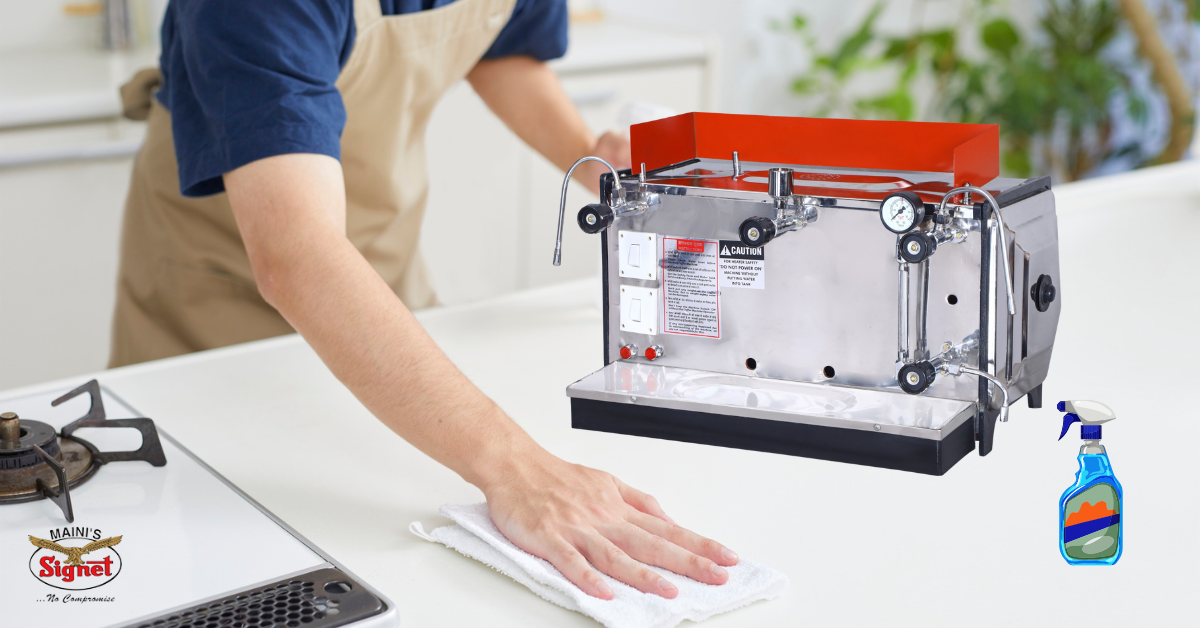If your daily cup of coffee no longer tastes as rich and aromatic as it once did, the issue might not be the beans – it could be your machine. Many Indian homes and offices are embracing coffee machines, but routine cleaning often takes a backseat.
A clean machine not only brews better-tasting coffee but also prevents long-term damage and potential health hazards.
In short: Coffee machines require light daily cleaning and deeper maintenance at regular intervals. This is even more crucial in India due to the climate, water quality, and dust levels in many cities.
Why Cleaning Matters Right Away?
Think of your coffee machine like any other kitchen appliance – your tawa, cooker, or mixie jar. You wouldn’t reuse them without a rinse, would you?
In India’s tropical and often humid weather, the risk of mold, bacterial growth, and hard water residue is higher. Left uncleaned, your coffee machine can:
- Spoil the taste of your brew
- Allow mold and bacteria to grow inside tanks and tubes
- Use more power due to blockages or inefficient heating
- Break down more frequently, leading to costly repairs or replacements
Regular cleaning isn’t just about taste – it’s about hygiene, performance, and longevity.
How Often Should You Clean Your Coffee Machine?
Here’s a simple guideline based on water quality, frequency of use, and climate:
01. For Indian Coffee Machines
Indian coffee machines, often simpler in design, primarily feature a steamer for milk and a drip tray. Regular cleaning is crucial for optimal performance and taste.

Daily Cleaning:
- Steamer/Milk Frother: Immediately after use, wipe the steam wand with a damp cloth and purge to clear milk residue. If detachable, rinse under hot water.
- Drip Tray: Empty and rinse daily with warm water.
- Coffee Filter/Chambers (traditional): Disassemble and rinse all parts thoroughly with warm water, using a soft brush for perforations.
- Exterior: Wipe down with a damp cloth.
Weekly Cleaning:
- Steamer Deep Clean: For non-detachable wands, submerge tip in warm water with mild soap/cleaner and purge. For detachable parts, soak in warm, soapy water for 15-20 minutes and scrub with a small brush. Rinse thoroughly.
- Drip Tray Deep Clean: Wash with warm, soapy water, scrubbing away stains. Rinse and dry.
- Coffee Filter/Chambers Deep Clean (traditional): Soak in warm, soapy water for 15-20 minutes. Use a stiff brush for perforations. Boiling can also sanitize and loosen residue. Rinse thoroughly.
- Water Reservoir (if applicable): Empty and wash with warm, soapy water. Rinse thoroughly.
Monthly Cleaning:
- Descaling (if applicable): If your machine has a heating element or water tank, descale monthly with a diluted white vinegar solution or mild commercial descaler. Run several cycles of plain water afterwards to rinse.
- General Inspection: Check for wear, cracks, or unusual buildup.
Consistent daily and weekly attention to the steamer and drip tray, along with occasional descaling, will ensure your Indian coffee machine delivers authentic and delicious coffee for years.
02. For Imported Coffee Machines
Maintaining your imported coffee machine, especially espresso machines, is essential for optimal performance and taste.
These machines often feature complex components requiring specific cleaning routines. Regular cleaning prevents the buildup of coffee oils and milk residue.
Daily Cleaning:
- Portafilter & Baskets: After each use, remove grounds, rinse with hot water, and wipe clean. Use a brush for stubborn residue.
- Group Head Purge: Run a short burst of water through the group head to flush out loose grounds and oils.
- Steam Wand: Immediately wipe with a damp cloth after steaming milk, then purge to clear internal residue.
- Drip Tray: Empty and rinse daily to prevent bacteria growth.
- Exterior: Wipe down with a damp cloth to remove splashes, dust, and fingerprints.
Weekly Cleaning:
- Backflushing (Espresso Machines with 3-way valve): Use a blind filter and espresso machine detergent. Cycle brew for 10-15 seconds, pause 5 seconds, repeat 5-10 times. Rinse thoroughly with plain water.
- Shower Screen & Group Gasket: Remove, soak in hot water with cleaner, scrub, and rinse before reattaching.
- Steam Wand Soak: Soak the tip in hot water with cleaner. Clean inside with a brush and ensure all holes are clear.
- Water Reservoir: Empty, wash with warm, soapy water, and rinse thoroughly.
Monthly Cleaning:
- Descaling: Crucial for removing limescale, especially with hard water. Follow your machine’s manual for specific descaling instructions and recommended solutions. Typically involves running a descaling solution through the machine, followed by several cycles of clean water.
Important Note: Always consult your specific imported coffee machine’s user manual for detailed cleaning instructions. Incorrect cleaning agents or methods can damage your machine and void its warranty.
The Disturbing Stats on Dirty Coffee Makers
- 50% of household coffee makers tested by NSF International were found to contain yeast and mold inside their reservoirs – a higher germ count than even bathroom faucet handles!
- According to the National Sanitation Foundation, a coffee maker is among the top five most germ-ridden items in the home kitchen.
Why Is Frequent Cleaning Needed?
Coffee machines accumulate:
- Oils from coffee grounds
- Fine coffee residue
- Stale water deposits
- Milk remnants (if using frothers)
- Limescale from hard water
If not cleaned regularly, these residues:
- Turn coffee bitter
- Slow down brewing
- Block internal pipes
- Strain the heating system
- Cause unpleasant odors
Just like you wouldn’t fry fresh food in yesterday’s leftover oil, you shouldn’t brew fresh coffee in a dirty machine.
Hard Water in Indian Cities Means More Frequent Descaling
One of the most overlooked yet crucial aspects of coffee machine care in India is how hard your local water is.
What is Hard Water?
Hard water contains high levels of minerals, particularly calcium and magnesium. When this water is heated in your coffee machine, these minerals form a chalky substance called limescale. Over time, limescale clogs the internal parts, blocks the heating element, and reduces the machine’s efficiency.

How Do You Know If You Have Hard Water?
Hard water is common in many Indian cities. If you notice:
- White deposits around your taps and showerheads
- Cloudy residue in your kettle
- A film on your tea or coffee
- Slower brewing or lower water flow in the machine
You likely have hard water.
Examples of Cities with Hard Water Issues:
- Delhi NCR – High TDS levels in groundwater
- Pune – Mineral-heavy borewell water
- Chennai – Hardness from groundwater use
- Jaipur, Hyderabad, Bhopal – High calcium content
What Should You Do?
01. Descale Monthly (if applicable): In cities with hard water, descaling every month is non-negotiable. If your usage is high (e.g., multiple brews a day), consider descaling twice a month.
02. Use RO or Filtered Water: This can delay the buildup of limescale but won’t eliminate it entirely.
03. Check Your Machine: Many machines now have descale alerts or self-clean cycles – don’t ignore them.
04. Use the Right Descaling Agent: Follow your machine’s manual. Vinegar-water mix works in emergencies, but it’s best to use manufacturer-recommended solutions for long-term care.
How to Know Your Coffee Machine Needs Immediate Cleaning?
Here are some points that you can look at:
- Coffee starts tasting bitter or “off.”
- Brew times are slowing down.
- Visible build-up appears inside the carafe or reservoir.
- Unpleasant odors even with fresh water.
Neglect leads to blockages – and sometimes, a full breakdown.
Looking for a Low-Maintenance Coffee Machine?
At Maini’s Signet, we offer machines built for Indian conditions – easy to clean, efficient, and perfect for both home and office use.
Explore our range of coffee machines designed for simple maintenance and long-term reliability.
Final Thoughts
In a country like India – where water quality, climate conditions, and airborne dust vary widely from region to region – regular coffee machine maintenance isn’t just a recommendation; it’s a necessity.
Whether you’re in Delhi with high TDS levels in water, in humid cities like Chennai or Kolkata, or using borewell water in tier-2 towns, your coffee machine is constantly exposed to conditions that can impact its performance and hygiene.
A neglected machine:
- Brews bitter, inconsistent coffee
- Consumes more power due to mineral blockages
- Requires more frequent servicing
- Becomes a potential breeding ground for mold and bacteria
On the other hand, a clean, well-maintained machine:
- Delivers rich, flavorful coffee with every brew
- Heats faster and runs more efficiently
- Has a longer lifespan and fewer breakdowns
- Maintains higher hygiene standards, especially important in Indian kitchens
Just like choosing quality beans, maintaining your machine is a critical part of your coffee experience. And it doesn’t have to be complicated – just a few minutes of care each day can make all the difference.
Have questions about cleaning your specific machine or dealing with hard water issues in your area? Drop them in the comments – we’re happy to help.
Looking for a machine that’s built for Indian conditions, easy to maintain, and delivers exceptional coffee every time? Explore our range of coffee machines at Maini’s Signet – designed with durability, hygiene, and convenience in mind.
Great coffee begins with a clean machine. Start your maintenance habit today – and taste the difference in every sip.




